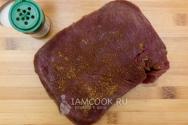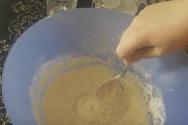How long does homemade cottage cheese last in the freezer? Storing cottage cheese - can it be frozen? Additional information about storage
All natural dairy and fermented milk products spoil quite quickly. But each product has its own shelf life. How long and how can you store cottage cheese?
Despite careful processing using one or another type of preservative, the process of so-called fermentation (reproduction of starter bacteria) does not stop. It cannot be stopped, it can only be slowed down. In addition, these bacteria come in different types. Some are present in the product initially, others are introduced from outside during processing and storage.
Shelf life of cottage cheese
Natural cottage cheese is a perishable fermented milk product. Its shelf life is regulated by sanitary standards. Cottage cheese is stored in the refrigerator from 2 to 14 days, depending on packaging and pre-treatment.
Pasteurized (unopened) cottage cheese can be kept in the refrigerator for 5 – 7 days at a temperature from 0 °C to + 6 °C. If the package is opened - only 1 day.
Homemade cottage cheese can be stored for no more than 2 days at temperatures from 0 °C to + 3 °C.
There is a shelf-stable product, sold in sealed packaging, its shelf life is about 14 days at temperatures from 0 ° C to + 6 ° C. This is if you don't open the package.
Before you place homemade cottage cheese in the refrigerator, it should be transferred to an enamel container with a tight-fitting lid. It is recommended to place several pieces of sugar along with the product in such a container.
If the cottage cheese has been stored for more than 1 day, it is best to heat it and use it for dumplings, casseroles, cheesecakes, etc. However, its taste may still be quite acceptable.
How to preserve beneficial properties?
If you buy cottage cheese by weight, especially not homemade, then you should immediately take a number of important steps. It is necessary to transfer the product from its original packaging to a plate or bowl. The container for storing the product must be enamel or plastic. It is very important that the container in which the product will be stored can be tightly closed with a lid. Before transferring, you need to place a cloth napkin on the bottom of the plate.
Advice from culinary experts: if there is no lid that will tightly close the container, you can use the well-known cling film. If there is a lot of cottage cheese, then it is worth dividing it into small portions.
The fat content of the product is also of great importance. If we compare cottage cheese with a minimum amount of fat and a maximum, then the low-fat one will be stored much longer than the fatty one.
For long-term storage of fatty cottage cheese, you need to put a piece of sugar at the bottom of the container. In this way, you can not only increase the shelf life, but also improve the taste of the product.
Is it possible to freeze cottage cheese?
Freezing dairy products as a method of long-term storage was known long before the invention of refrigerators. In the Far North, this method of storage in specially equipped glaciers is still practiced. Safety in food for almost everyone nutritional properties after defrosting has been proven theoretically and in practice.
You can and should freeze cottage cheese if you do not plan to use it in the near future, but you need to do it correctly. At a freezing temperature below -12 degrees, its shelf life will be up to a month. However, sometimes they store it longer. When defrosting the product, the taste will remain the same, but there is a high probability of a change in consistency. Frozen cottage cheese will already be a curd mass.
How to freeze cottage cheese correctly?
It is not difficult to properly freeze cottage cheese in the freezer. But after this, it is important to maintain a constant temperature regime - you cannot defrost and refreeze. Before cooling, homemade cottage cheese should be divided into portions for single use. Portions can be packed in freezer containers or cling film bags.
Preference for freezing should be given to granular cottage cheese rather than pasty cottage cheese.
Cottage cheese purchased in a package is frozen as is, without opening the package - this way it will be stored longer.
Before eating, you need to take out the portion that will be used and place it on the bottom shelf of the refrigerator. There is a minimum temperature in the entire refrigeration system. This is necessary in order not to expose the protein to sudden changes in temperature, because in this case its original properties are lost.
If you plan to fry cheesecakes or bake a pie from frozen cottage cheese, you can defrost it immediately at room temperature. Once the product has been defrosted, it is best to use it immediately. The maximum shelf life after defrosting is one day.
It is worth understanding that the longer a product is stored in the freezer, the worse its taste and texture will be when defrosted. But as said earlier, it loses its texture and crumbles when defrosted.
If you follow the above rules, the cottage cheese will remain fresh for a long time. It will not change its properties if it is stored fresh and of high quality.
How and where to store cottage cheese
Each housewife has her own secrets and her own storage methods. some store it in a plastic container and tightly closed, while others store it in a ceramic container without closing it. Every man to his own taste..
I think the best option would be to use the cottage cheese fresh!!
And yet, how long can you store cottage cheese in the refrigerator? I usually store homemade cottage cheese for about a week, and then fry the cheesecakes, so they eat it faster.
It is better to store cottage cheese in gauze and on a plate; it should breathe and not sour or suffocate.
The best solution is to buy fresh cottage cheese and stock up for future use. Well, if you brought a couple of kilograms from the village, then shove it in the freezer, you won’t eat it in a week anyway, and they don’t recommend storing it longer, both the taste and beneficial properties will disappear.
Once I was with the Old Believers on the Yenisei River and they taught me to preserve cottage cheese for a long time, more than a week, and no bacteria poisoned it and it was tender and very tasty. Before cooking the cottage cheese, they salted it a little, and when it was ready, they put it in a birch container and placed a small salt shaker on top. And then the cottage cheese is preserved for a long time and does not spoil, and the Old Believers do not have refrigerators at all, but they do have glaciers and cellars. So if you want, you can try this method, but it only applies to a natural milk product and not some store-bought rubbish.
Nowadays, cottage cheese is stored in the refrigerator or freezer. But such cottage cheese will be fresh for no longer than five or seven days. If you have a lot of cottage cheese, you can make cheesecakes and freeze them, and heat them in the microwave before eating. It is not recommended to store cottage cheese for a long time, as it is a perishable product.
Storage of loose cottage cheese may also depend on the quality of the cottage cheese itself.
I store this cottage cheese in a plastic or glass container. I spread the cottage cheese and put a piece of refined sugar in the corners of the dish, two pieces are enough. Cottage cheese is stored longer and retains its taste.
It is better not to store cottage cheese for a long time, the most delicious cottage cheese is fresh (like other products), but if you have to store it for some time, store it in a closed container in the refrigerator so that it does not peroxidize and lose moisture, you can freeze it, but the taste will not be the same.
Cottage cheese, as you know, cannot be stored in the refrigerator for a long time. For long-term storage, it can be frozen, although this method can hardly be called popular.
According to GOST R 52096-2003, the temperature of the cottage cheese when leaving the manufacturer should be 4 degrees Celsius plus/minus two degrees.
The date of manufacture, storage conditions, expiration date - until what date/hour it is good for - must be indicated on the product packaging.
I set the temperature mode in the refrigerator to the most intense (that is, I set the temperature as low as possible). I have read more than once that this mode allows you to save a considerable amount of food (which otherwise spoils faster and is thrown away).
I try to store cottage cheese for no more than two or three days. It is better to use not the freshest cottage cheese for cheesecakes and dumplings.
Of course, natural cottage cheese has a short shelf life, and if the temperature conditions are violated, the shelf life of the cottage cheese may decrease. That's why, cottage cheese is better Buy enough to eat it as fresh as possible during the day. But still, sometimes the cottage cheese remains. In order for the cottage cheese to retain its taste for the next days, I do this: put the cottage cheese in a food bag, and put it in a second one (one inside the other) and completely squeeze out the air. Then, rotating, I twist the bag of cottage cheese and place it in the refrigerator. It turns out, as it were, vacuum storage of protein, so the oxidation of the product without air access occurs much more slowly and therefore is stored longer.
If you make cottage cheese yourself, then we store it for about a week in an open cup. It is necessary for the cottage cheese to breathe, otherwise it may become moldy. It is better to store in a glass container with a lid (leave a small gap) rather than in a plastic bag. But then it can dry out. If you add a little sour cream, it will be tasty and healthy.
You can also make very tasty dumplings from dried cottage cheese.
The cottage cheese that is sold in stores by weight contains special substances and emulsifiers that prevent its spoilage for some time, so the shelf life of store-bought cottage cheese is higher than that of healthy homemade cottage cheese.
I don’t understand why people write such advice and answers. They write about the cellar, about storing it in a rag... It’s the 21st century, however. Is it really such a passion to write anyhow? It seems like no one is paid money and they don’t hang a medal for this...
for example, for a hundred years now there have been freely available refrigerators with a biozone (each manufacturer calls it differently), where the temperature is +1 - +2 degrees. Cottage cheese lives wonderfully there. Again, everyone writes about the obligatory ceramic dishes, but no one even mentioned why. No, really, why? I have been buying cottage cheese from the same farm for years, a week in advance. I buy it on the weekend and eat it until Thursday or Friday. Just as it was hung in cellophane, the cottage cheese lives there. No bitterness or other nonsense happens, except that the cottage cheese becomes slightly drier by the last day. The taste of cottage cheese remains almost unchanged, and I have a strict attitude towards this. I don't drink/smoke, so my taste buds are functioning properly.
Some even recommend adding garlic! Then it will definitely burn :)
Homemade homemade cottage cheese is a perishable product. You can store it for no more than 2 maximum 3 days in the refrigerator.

Despite the fact that homemade cottage cheese is often sold in plastic bags, you cannot continue to store it in them: at home, the purchase must be transferred to an enamel or glassware with lid.
If there is a need to preserve the cottage cheese longer, it can be frozen. And it turns out that deep freezing of cottage cheese is widespread on a national scale (this is how the state fights the seasonality of cottage cheese consumption) both in our country and in Europe. To do this, in the summer, part of the cottage cheese is placed in wooden tubs and frozen at -35 degrees with further storage for up to 6 months at -18.
After defrosting, microorganisms in the cottage cheese become active very quickly. But it seems to me that his taste changes a little.
Purchased cottage cheese is partially processed, so its shelf life is up to 7 days, but it can also be stored at a temperature range of 0 to 8 degrees (i.e. in the refrigerator).
A person needs a varied and complete diet to maintain health and good immunity, allowing him to avoid troubles associated with diseases. Cottage cheese is considered one of the real storehouses of useful substances. It is rich in protein, iron and calcium necessary for the development of muscle tissue. Moreover, it is useful not only for adults, but also for children.
Even the most useful product can cause harm to the body if the rules for its optimal storage are violated. Stale cottage cheese can cause indigestion, dysbiosis and even food poisoning - therefore it is extremely important to know how long you can store it and under what conditions without danger to health.
How long will it stay fresh in the refrigerator?
This fermented milk product is obtained by separating milk protein from whey. The process is directly related to milk peroxidation - it is produced by lactic bacteria contained in the liquid, which separate the milk into fractions.
Bacteria continue their vital activity in the finished cottage cheese, so it has an extremely limited shelf life. Without a refrigeration chamber, it can remain fresh for no more than a day (and at temperatures above 15 degrees Celsius - only a few hours).
Fortunately, there is a refrigeration unit in every equipped kitchen, so those who like to try this product should not have any problems. Experts in the field of food technology claim that in such conditions it remains fresh for no more than two days.
Important! Cottage cheese stored in the cold without any tricks is suitable for eating without heat treatment (in its original form) only in the first twenty-four hours after purchase (provided that it is really fresh)! On the second day it becomes conditionally edible and requires heat treatment before consumption.
It is worth noting that children’s immunity and digestive system are much weaker than those of an adult, so it is highly advisable to give children only fresh cottage cheese that has been in the refrigerator for no more than a day.
However, it is worth noting that there are many ways to extend the life of this product by two to three days or even a week. Buying it every day may not be part of the plans of its lover - many modern inhabitants prefer to make massive purchases and are not used to making exceptions even for perishable food. The ways in which pleasure can be seriously extended should be described in more detail.
Storage options
There are quite a large number of standard ways to preserve the freshness of this nutritious and delicious product in the refrigerator, but not all of them are equally effective. Let's take a closer look at them.
- Opened (in a serving vessel - container or plate). This method is used most often, since cottage cheese sells out quite quickly in the families of its lovers. In this case, keeping it in an open container is convenient and practical: any family member can set aside a certain amount of curd mass for themselves at any time. How long can you keep it open? Usually - no more than two days, in some cases it is possible to extend this period to three days from the date of purchase.
- Many people are too lazy to immediately unpack the purchased cottage cheese, which is why they leave it in the bag. Unfortunately, it won't last long in this form. Already after a day and a half from the moment of purchasing a fresh product, it should be considered conditionally suitable. In moisture-proof cellophane it “sweats”, which is why after a short time it acquires an unpleasant, specific musty odor. Its appearance means that in the future the product is only suitable for baking - it is strictly not recommended to consume it raw.
- IN enamel pan or in a bowl, the cottage cheese is preserved just fine: it can lie there for up to four to five days, and at the same time remain fresh for two days after purchase (if the product was still fresh at that moment). Many housewives recommend covering the enamel dishes with a tight lid and adding a few pieces of refined sugar to the cottage cheese. Sugar absorbs moisture evaporating from the product, so it does not acquire a musty smell much longer.
Important! Its shelf life depends not only on what container it is kept in, but also on what shelf it is placed on. It stays fresh the longest on the bottom shelf of the refrigerator - where the temperature is lowest (due to the proximity of the freezer compartment). For added effect, you can place it in the vegetable drawer - it is traditionally located under the bottom shelf of the refrigerator compartment, and the temperature in it is even lower. So he can easily withstand a week.
However, these options are not the best for increasing its freshness. Some tricks can achieve truly impressive results, and they are worth discussing separately and in more detail.

Can I keep it in the freezer?
Its shelf life in the refrigerator cannot be compared with its shelf life in the freezer. Temperatures below zero significantly slow down the metabolic rate of the lactobacilli living in cottage cheese, due to which it spoils much more slowly and, therefore, is suitable for consumption for much longer.Cottage cheese frozen at -35 degrees Celsius immediately after production can remain usable for up to three weeks. During this time, even a small family can eat several kilograms of it - therefore this method is the most optimal if it is necessary to preserve a large volume of it.
Unfortunately, the method also has its drawbacks. Before eating, the curd mass must be properly defrosted - and this process is quite lengthy. If you want to try this dish, it will be impossible to satisfy your desire right away. It can only be defrosted in the refrigerator, which takes ten to twelve hours. When defrosted at room temperature (within 4-5 hours), it loses its structure and taste, and is only suitable for baking or other methods of cooking through heat treatment.
Important! Products made from fresh cottage cheese, subsequently frozen at a temperature of -5 degrees (the standard temperature of a household freezer, have a shelf life of only four days! If the storage period is exceeded, eating such a product will not cause harm, but it will lose most of its taste and nutritional properties, as well as a crumbly granular structure, will become viscous and homogeneous.

Storage in vacuum packaging
However, even a freezer cannot compare in terms of quality of storage of this fermented milk product with vacuum packaging.
Vacuum packaging allows you to isolate the product from the surrounding gaseous environment. This seriously inhibits and practically stops the development and metabolism of bacteria living in fermented milk products, which require gases to continue their vital functions. Thus, the shelf life of cottage cheese in such a container is determined not by sanitary safety standards, but rather by the appetite of its owner.
Compared to freezing barely made cottage cheese, the method using vacuum packaging is much simpler and more convenient. The inconvenient moment with the duration of its defrosting after freezer.
Important! Different types of packaging using vacuum have different efficiencies. It is impossible to name the exact period of safe storage in them: in one container its contents can lie for three weeks and remain fresh, while in another it will acquire a scent within a week. The suitability of a product can be determined, again, by the presence of a musty smell. If it is present, but rather weakly expressed, the curd can be used in baking, but if the smell has become strong and pungent, it is better to throw it away and not risk your health.

In order to better understand which method of storing the product is best, you can watch this video.
It will be able to answer many questions that interest the average person and help avoid various mistakes.
One of the most delicious and healthy fermented milk products, cottage cheese, has long occupied its place in the diet of almost every family. It is an invariable component of a huge number of diets, allowing you to keep the body in good shape. And just try it of this delicacy Many strive.
And in order for this most important storehouse of substances necessary for the body to remain fresh for as long as possible, you need to know how long cottage cheese can be stored in the refrigerator and how to do it correctly.
Peculiarities

In the photo - proper food storage is an important part of household chores.
Cottage cheese has deservedly gained its popularity, because it contains many:
- vitamins;
- proteins;
- mineral salts;
- fat
For sick people, this fermented milk product helps restore health and strength, and for healthy people, it helps prevent the occurrence of certain diseases. To correctly understand how long cottage cheese can be stored in the refrigerator, it is important to determine its type.
There are several categories here:

- at least 18% fat content – full-fat cottage cheese made from selected whole milk;
- about 9% fat – a semi-fat product, the main components of which are whole and skimmed milk simultaneously;
- less than 9% fat content - low-fat cottage cheese, which is made only from freshly skimmed skim milk.
I would like to note that the most easily digestible type is the latter, low-fat cottage cheese, due to the fact that it is full of nutritious milk proteins.

Despite the many benefits of fermented milk delicacies, the question of how to properly store cottage cheese in the refrigerator is one of the most pressing. I'll talk about this in the next section.
Optimal shelf life
The first thing you need to remember: cottage cheese is one of the most perishable types of food, which is strongly not recommended for long-term storage. After just a short time, it loses its excellent taste, acquiring an unpleasant bitterness.
In general, the shelf life of cottage cheese in the refrigerator is determined by two important factors:
- Continuous life processes of bacteria in the product.
- Activity of enzymes and microflora.
I cannot help but note that even the type of packaging significantly affects the shelf life of a given product.
In a refrigerator

Did you know that in ancient times, when the refrigerator was not part of the mandatory home appliances, were fermented milk products stored by wrapping them in a pre-moistened cloth? After this, the food was placed in a cool, dry place where the temperature did not exceed 15 degrees.
Nowadays, food storage conditions are much simpler, and you can find out how long to store cottage cheese in the refrigerator by the power of the unit itself.
There are two options here:
- If you purchased fresh cottage cheese, you can store it for exactly 2 days. The main thing is that the temperature does not exceed 8 degrees, the optimal indicator is 2-6 ° C;
- If you have a powerful refrigerator that freezes food quite strongly, the shelf life automatically doubles to 4 days.

There are also several nuances that any housewife would do well to know about.
- Before placing the cottage cheese on the refrigerator shelf, wrap it in foil or parchment paper.
- An excellent option would be to place it in an enamel bowl, into which you should also add a few pieces of refined sugar. This way you can achieve the maximum shelf life for this type of food.
- Having learned how to store cottage cheese in the refrigerator and having kept it for half the allotted time, it is better to expose the remaining product to heat treatment. What I mean is that you can use them to make casseroles, dumplings or cheesecakes.

In the freezer
How long open cottage cheese is stored in the refrigerator, or rather in the freezer, again depends on the temperature existing in it.
- If the temperature in the chamber reaches -35 degrees, cottage cheese can be stored for about one to two months. Agree, it is very convenient to always have such a valuable and useful product on hand.
- At temperatures of -12 – -18 degrees, storage duration is significantly reduced, but still far exceeds refrigeration time. In such a freezer the product can be stored for about two weeks.
- If the freezer temperature fluctuates between -2 and 0 degrees, contain so much healthy treat possible within 6 days.

I’ll tell you a little secret of how to extend the shelf life of your favorite treat with your own hands. Place a regular paper towel on the bottom of a plastic food container and fill it with crumbled cottage cheese. Cover the container tightly with a lid and immediately place it in the freezer.
Additional information about storage
I have already described how long cottage cheese is stored in the refrigerator in a bag or enamel container, but this applies more to a regular store-bought product. Homemade food, not exposed additional treatments and the addition of preservatives, has its own storage conditions.
Homemade cottage cheese

The question of how long homemade cottage cheese can be stored in the refrigerator is quite difficult and does not have a clear answer.
Everything will depend on the freshness of the product itself.
- The shelf life of homemade cottage cheese in the refrigerator, prepared with your own hands, can reach about 48 hours.
- A product purchased from your grandmother at the market (even if it has been tested) is better to eat on the day of purchase. Taking risks and relying only on appearance is more expensive for yourself. The price for such confidence is poisoning with a serious course of the disease.
Vacuum packaging

Cottage cheese purchased in vacuum packaging is a real record holder for shelf life. The vacuum allows the product to remain fresh, tasty and suitable for consumption for about a month. Agree, this is much more than the food content in ordinary paper.
The instructions on the packaging will tell you the most optimal temperature for storage; you just have to choose the appropriate one in the refrigerator.
Finally
In this material, I looked at the features and shelf life of this or that type of cottage cheese, and also told you in which container it is best to do this. By adhering to basic recommendations and basic safety rules, you will always consume only fresh and unspoiled product.
It's no secret that cottage cheese is considered one of the healthiest dairy products. However, it cannot be stored in the refrigerator for a long time and after a short period of time it begins to lose its taste and valuable substances. In addition, consumption is fraught with serious problems with the gastrointestinal tract. From this article you will learn the exact shelf life of cottage cheese and the rules for storing it.
How to keep food fresh in the refrigerator?
Many lovers of cottage cheese keep it in an open container, believing that this method is the most convenient and practical. IN in this case The freshness of the product is maintained for two days.
Many housewives who want to understand the shelf life of cottage cheese in the refrigerator are too lazy to immediately unpack the product they bring home and send it for storage directly in the bag. Such actions lead to rapid spoilage. After just a day and a half, such a product is considered conditionally suitable for consumption. Cottage cheese, wrapped in moisture-proof cellophane, begins to “sweat”, as a result of which an unpleasant musty smell begins to emanate from it. The appearance of such a specific “aroma” indicates that such a product can no longer be consumed raw.
To increase cottage cheese and curd products, you need to place them in an enamel bowl. A product stored in this way can remain fresh for four days. Many experienced housewives recommend covering the bowl with a tight lid, after putting a few pieces of refined sugar in it. Thanks to this, the product will not acquire a musty smell.
It is also necessary to understand that the shelf life of cottage cheese largely depends not only on what container it is stored in, but also on what shelf it is placed on. It stays fresh the longest if you place it close to the freezer compartment. There it can be stored for no more than a week.
Frozen cottage cheese
Low temperatures significantly slow down the metabolic rate of lactobacilli living in this product. As a result, it stays fresh longer. Thus, the shelf life of homemade cottage cheese frozen at -35 degrees is about three weeks. During this period of time, even a small family will have time to eat a couple of kilograms of this product.

Cottage cheese stored in this way should only be defrosted in the refrigerator. This is a rather lengthy process, taking at least ten hours. A product defrosted in violation of technology loses not only its grain structure, but also its taste. As a result, it can only be used after heat treatment.
How long can a vacuum-sealed product be stored?
The use of this technique allows you to protect fermented milk from the influence of external gas environments. As a result of slowing down the development and metabolism of bacteria, the shelf life of cottage cheese is extended. This method is much more convenient and easier than freezing. Its advantages include the absence of the need to wait for a long time while it size.

At the same time, we must not forget that different types vacuum packaging are characterized by their own efficiency. Therefore, no one will tell you the exact expiration date of cottage cheese according to GOST, stored in this way. In one container it can easily lie for three weeks, but in another it will begin to deteriorate after a few days.
How did our ancestors prepare and store cottage cheese?
The fact that people who lived during the times of Ancient Rus' knew this. In that era, raw materials for the production of useful and delicious cottage cheese I served ordinary yogurt. It was placed in a deep clay vessel and sent to the oven. The mass obtained as a result of heating was placed under a press.

To store this fermented milk product in those days, they used a clean cloth, previously soaked in water. It was used to wrap dishes with cottage cheese and place them in a cool place.
What to look for when purchasing?
To prevent cottage cheese from becoming a cause of poisoning, you need to know how to choose it correctly. The first thing you should look at when purchasing is the expiration date. In this product, E. coli most actively develops and multiplies, therefore it cannot be purchased at unverified retail outlets and in spontaneous markets.

Homemade cottage cheese made from sour milk is considered the most dangerous to health. This is due to the fact that such a product may contain pathogenic microorganisms. Even the beautiful appearance of cottage cheese does not guarantee that it was produced under sterile conditions with strict adherence to the technological process.
This product should not be kept in plastic bags or cling film, as this leads to rapid oxidation and the appearance of an unpleasant odor. To extend the shelf life of cottage cheese and preserve its taste longer, it is recommended to place the product in a glass or enamel container with an airtight lid. If desired, you can also send a small amount of sugar there, which absorbs excess moisture.
You can keep the cottage cheese fresh by wrapping it in parchment paper, foil or cheesecloth. In the refrigerator it can be placed in the compartment intended for storing vegetables. A product left on an open plate for 72 hours is subject to mandatory heat treatment.
Semi-finished products made from cottage cheese cannot be stored for more than four days. Otherwise, they lose most of their valuable properties and become dangerous to human health.







